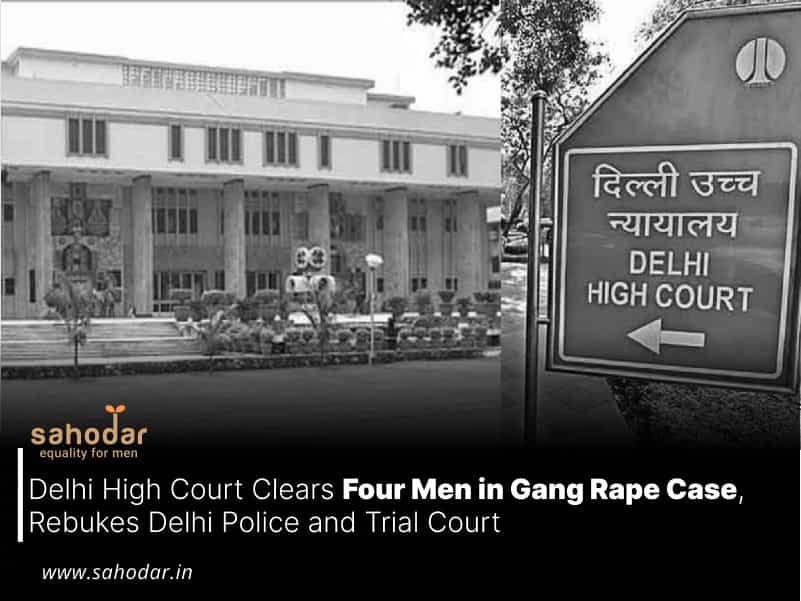The Court criticised the trial court for getting carried away with prosecutrix’s first statement and ignoring the fact that the statement was later disowned by her.
On Monday, the Delhi High Court overturned a trial court’s decision that sentenced four men to life imprisonment for the purported gang rape of a woman [Pawan Sharma & Ors v State Govt of NCT of Delhi].
A panel consisting of Justices Suresh Kumar Kait and Manoj Jain rebuked the Delhi Police for their inadequate investigation and chastised the trial court for being overly influenced by the initial statement of the complainant, which she later retracted during the trial.
“Learned Trial Court also did not give any weightage to the fact that such statement was made by her on July 29, 2018 and immediately thereafter when she was produced before the concerned learned Magistrate, she, in her statement under Section 164 CrPC, categorically claimed that she had left the home of her own and same version was reiterated by her in the witness box. In such a situation, there was virtually nothing which could have indicated that she had been kidnapped and then confined and gang-raped,” the Bench noted.
Regarding the police investigation, the Court noted that despite the complainant contacting the police from her personal mobile phone, crucial documentation such as the PCR form and Call Detail Records (CDR) were not submitted as evidence. These records were deemed essential to establish her whereabouts and to bolster the prosecution’s case.
“As already noted, as per ‘G’, her mobile was seized by the police. It seems that no effort was made to obtain the Call Details Record and to place the same on record. Holding back such valuable piece of evidence has to be taken as a circumstance against the prosecution. We will not mince any word in commenting that Call Details Record of ‘G’ would have also reflected her location which could have even strengthened the case of prosecution but is not explicable as to why such valuable piece of evidence was not bothered to be collected. Thus, a golden opportunity went begging,” the Court said.
The Court further noted that even if semen was found on the victim’s leggings and matched the DNA profile of the accused individuals, it shouldn’t automatically imply a case of sexual assault, especially considering the absence of any statement from the woman regarding such an incident.
The Court emphasized that it could have been perceived as a consensual physical relationship.
The Court addressed an appeal lodged by four men who had been convicted for offenses under Sections 376D (gang-rape), 328 (causing harm to a person by administering poison or any harmful substance with the intent to commit or facilitate an offense), 366 (kidnapping), and 34 (acts done by several persons in furtherance of common intention) of the Indian Penal Code (IPC).
According to the First Information Report (FIR), the woman had left her home to visit a local temple on foot. During her journey, she was allegedly grabbed from behind by someone, rendered unconscious, and taken to Ballabhgarh. Upon regaining consciousness, she found herself naked in a room with the four accused individuals, whom she recognized as residents of her village.
However, in her statement under Section 164 of the Criminal Procedure Code (CrPC), the woman did not assert that she had been kidnapped and sexually assaulted. Instead, she stated that she had left home and traveled to her native village due to stress, and the FIR was lodged because she was delayed in reaching the village.
The Court scrutinized the case and noted discrepancies even in the testimonies of the prosecutrix’s parents. While the mother claimed that her daughter returned home the same day she went missing, the father stated that she had been missing for several days.
“Moreover, as already noticed, case of prosecution was that complaint was lodged by ‘G’ in the presence of her mother but her mother has taken complete somersault and has denied any such thing,” the Court noted.Top of Form
Ultimately, the Court concluded that there was insufficient evidence on record to substantiate the prosecution’s case and acquitted the accused.
“No incriminating word has been whispered by ‘G’ and her parents. Investigation is also not upto the mark as neither PCR form nor CDR of mobile of ‘G’ were placed on record. Keeping in mind the fact that ‘G’ was major at the relevant time, DNA report, which was not even put to the accused under Section 313 Cr.P.C., does not carry any value. Resultantly, we allow the appeal and acquit all the accused persons of the charges,” the Court ruled.
Senior Advocate Harshvir Pratap Sharma, accompanied by advocates Stuti Jain, Akshu Jain, Akul Krishnan, and Amit Kumar, represented the four appellants.

